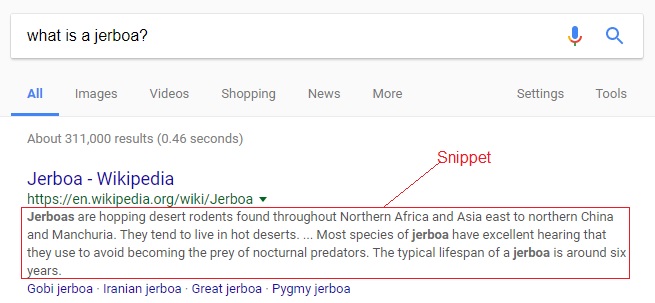In a change which occurred in November 2017 that most people won’t notice until 2018, page descriptions in Google search results have recently become significantly larger. These page descriptions are technically called “snippets”, not to be confused with “featured snippets”. Most people know snippets as Meta Descriptions. That’s because a page’s Meta Description is what is often shown in search results as a snippet.
In other words:
You can manually edit a page’s Meta Description. And in many cases, that is what is shown in Google’s search engine results pages. However, the technical name for what is displayed is a Snippet.
Screenshot:
Why Is Google Showing the WRONG Meta Description?
Depending on what the user is searching for, Google may adjust the snippet shown on the fly. This began a long time ago. I don’t have an exact date but Google has indeed displayed relevant content from a webpage in place of the meta description you manually wrote since before 2010.
Indeed, they have been displaying more and more of their own snippets instead of yours as time has gone on.
At Telapost, we produce hundreds of articles every month for websites worldwide. I personally stopped setting meta descriptions on the majority of content we publish in 2014. I still use them from time to time however I do not spend a significant amount of time on them. They do not affect SEO and in most cases people will never see your meta description. If they aren’t on a vitally important piece of content, I skip them. Like on this article – I’ll be skipping a meta description.
Snippets Expand past 160 characters
I have a theory on this which I will publish in an article tonight or tomorrow! I am very excited about this theory. Anyways, for now I will stick with the facts.
Snppets are no longer limited to 160 characters. I am not counting the characters although I do know for a fact that Google’s snippets are now as much as 250 – 320 characters. In fact, Google’s Snippets are now the same size as “Featured Snippets”.
An interesting test would be to set some Meta Descriptions to be 250 characters to see if they will influence snippets. However, I already know from HOW the content is being extracted from the page that this will not affect snippets.
Actionable advice
This is tough to put into words but I have seen some excellent snippets for content I have produced. However, I have a very unique style of writing which I call “writing for the web”. I’ve studied user behavior since 1991, long before there was a search engine and I know precisely how people use their computers, so I place content in certain areas of a page a certain way. Most people do not do this, however, and it does lead to some funny looking snippets. However, I do not blame people for bad snippets, I blame Google, who will eventually learn how to extract content from webpages better and better as time goes on.
Ugly snippets
If you are experiencing an ugly snippet, just give it some time and Google will correct the snippet. This occurs all the time with Featured Snippets, and the typical waiting period is anywhere from 3 days – 3 weeks. I personally believe that the more traffic a snippet gets the faster it will correct itself.
- Google “Pure Spam” Penalty Deindexes Sites March 6 2024 - March 12, 2024
- What Happened to ChicagoNow.com? - August 30, 2022
- The December 2021 Google Local Pack Algorithm Update - December 17, 2021





Leave a Reply